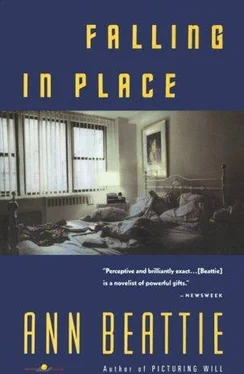Ann Beattie - Falling in Place
Здесь есть возможность читать онлайн «Ann Beattie - Falling in Place» весь текст электронной книги совершенно бесплатно (целиком полную версию без сокращений). В некоторых случаях можно слушать аудио, скачать через торрент в формате fb2 и присутствует краткое содержание. Год выпуска: 1991, Издательство: Vintage, Жанр: Современная проза, на английском языке. Описание произведения, (предисловие) а так же отзывы посетителей доступны на портале библиотеки ЛибКат.
- Название:Falling in Place
- Автор:
- Издательство:Vintage
- Жанр:
- Год:1991
- ISBN:нет данных
- Рейтинг книги:4 / 5. Голосов: 1
-
Избранное:Добавить в избранное
- Отзывы:
-
Ваша оценка:
- 80
- 1
- 2
- 3
- 4
- 5
Falling in Place: краткое содержание, описание и аннотация
Предлагаем к чтению аннотацию, описание, краткое содержание или предисловие (зависит от того, что написал сам автор книги «Falling in Place»). Если вы не нашли необходимую информацию о книге — напишите в комментариях, мы постараемся отыскать её.
Falling in Place — читать онлайн бесплатно полную книгу (весь текст) целиком
Ниже представлен текст книги, разбитый по страницам. Система сохранения места последней прочитанной страницы, позволяет с удобством читать онлайн бесплатно книгу «Falling in Place», без необходимости каждый раз заново искать на чём Вы остановились. Поставьте закладку, и сможете в любой момент перейти на страницу, на которой закончили чтение.
Интервал:
Закладка:
He hated to talk to her on the telephone and always had. That night he had made a fool of himself by blurting out: “Listen — do you want any donuts?” When he called her at work she could never reply to what he said, and what he said was never what he meant to say. Someone was always standing behind him waiting for the phone; or he’d call from the office and he’d hear her voice and realize how bleak his surroundings were, and overwhelmed by that, would be unable to talk. Or at phones along the highway: He’d know the road was out there and he could never put it out of his mind. There were always dark spaces, highways, impatient people — something to make what he was saying, or trying to say, not make sense. He would call and tell her he loved her as someone pushed change into a vending machine. Something they wanted would be falling through the machine — a soft drink or a candy bar — and his eye would wander, and it would seem that everything was so mundane, that his words couldn’t carry any conviction. He woke her up more than he should. He would get obsessed with calling her. At night, in New York, he would tear himself away from her, and then he would stop to call three times before he got back to Rye and then call again from the dark hallway, whispering like a criminal who had broken into the house. He would talk to her about love, standing in the dark of his mother’s house, feeling like a child who couldn’t possibly know what he was saying. Then, sometimes, he would explain to her, when she was sleepy and perturbed, why he knew he wasn’t getting through to her: Suddenly he would be telling her something that wasn’t about the two of them at all, but about his mother and father, some memory, or he would describe the place he was calling from, his hand nervously touching the phone, putting his finger into the dial, touching inside the 1, the 2, the 3, his finger probing the phone as if one circle might be the right one, and somehow he would really connect with her. Again and again, standing in the same place, late at night, in the dark, Henri the poodle staring and panting as he whispered, he would hear her voice and his finger would start to move, as though the phone were a Ouija board. Or sometimes he would know that he had awakened her and say nothing about love, say only that he was sorry for having made her get up to answer the phone. Once he had called her from a phone outside the parking garage — he had left her apartment, so upset about leaving that he had walked for half an hour instead of taking a cab — and there was something wrong with the phone. He had had to put four dimes in before he made the connection, and when she answered, he had only been able to tell her that he had walked, that there was a phone out of order in New York. Then he had stared at a couple walking by; he had held the phone tightly in one hand, his claim check for his car in the other, and he remembered thinking that if he let the phone go, he was going to disappear. He had dropped endless nickels into the phone and kept her talking for an hour. She didn’t understand about him and the phone. He tried to explain it to her in person, but even then he never really got through. At first when he would leave and call her half an hour later, an hour later, she got angry and accused him of being paranoid and checking on her. She had first said that to him on the phone, and he couldn’t deal with criticism on the phone: He would just lose his words, and be silent, and then she would think that he had gone, and he would panic, thinking: Please don’t hang up. Think I’m not here, but please don’t hang up. It was only in the movies that you could jiggle the cradle of a telephone up and down saying three or four times “Hello? Hello?” and still be connected. He couldn’t stand it, either, if she joked on the phone. Once, five minutes after he had left her, he had called and told her he loved her and she had said, sounding genuinely confused, “Who is this?” He would seek out phones because they connected him to her, knowing all the time that that was an illusion: a piece of black plastic, his hand on a piece of black plastic miles away from her hand. How could he think he was touching her? He would call her and imagine her standing there, holding the telephone. She was used to all of it by now. She said “That’s okay” reflexively when he said he was sorry for waking her; she would tell him without protest whether she was sitting or standing, wearing clothes or pajamas: whatever he wanted to know. She had said to him, early on, that maybe it would be better if they didn’t talk on the telephone, and he had been amazed that she hadn’t understood: It was like admitting that they were defeated. They were already separated too much, and the phone was a false link, but still a link. “You wouldn’t not answer your phone, would you?” he had said. “Maybe if you didn’t look around you when you called,” she said, “you could concentrate on what you wanted to say.” So he had closed his eyes, holding the phone against his ear, everything black. She had given him a toy telephone for Christmas, her face glued in the center, smiling a big smile. When you dialed the phone, a childish voice would say: “I am five, how old are you?” Dial again, and the voice would say: “Will you be my friend?” He knew that it was funny, but it also wasn’t funny: It was his nightmare telephone, the telephone on which you couldn’t say what you wanted, on which words were just words and went nowhere. He had given the toy telephone to Nick to give his son. He would have given it to Brandt, but he didn’t even want it around. The little circular picture was in his desk drawer. It reminded him of the telephone, and it was the one picture of Nina he didn’t really like to look at. But he kept it. It was there. Until Nina had shown him, he had never thought about his favorite sleeping position: on his side, with one arm along his body, the other arm raised, fingers curled, just below the ear. In bed one night, she had faced him, imitating his position, and said, “Hello, John? Everything all right?”
He opened his eyes and saw that she was on the bed facing him now, and he wanted to rouse himself to console her. But his body felt heavy — the sudden heaviness you feel when you’ve been treading water and are about to sink, a signal from your body that it isn’t worth it to fight anymore. He was lying on his back, hot and heavy on the mattress, and she was on her side, supporting herself on one arm, her free hand resting on the sheet. If she were to put her hand on him, that little bit of added weight would push him under. He looked at her hand, and not at her face. It was such a small hand, the fingers long and thin — he had forgotten if he had ever held such a hand when he was young, when his own hand was smaller.
She had once said that he was a coward. Cowardly to leave his family and not totally cut the tie. Cowardly to go, and cowardly to return, and all the time he was in Connecticut feeling heavy — his heart heavy. He felt old, and more tired than he felt when he was physically tired, driving home late to his mother’s house in Rye. The truth was that he didn’t have much grace. He could have eased Louise into discussions, but he hadn’t. Louise could still take him by surprise, and he was afraid of that. The only thing that had taken him by surprise that had been a good surprise, a surprise he could deal with, had been Nina. When she had opened the door and he had seen the man standing there, he had misunderstood, in a flash, what kind of scene he had walked in on; and he had only been able to stand there, as stunned as he was when somebody pulled a trick on him on the telephone, unable to think about what was happening but staring at her breast, the robe fallen away so that he saw the curve of her breast almost to the nipple. He had no idea what he would have done or said if she had not spoken. He could imagine standing there still.
Читать дальшеИнтервал:
Закладка:
Похожие книги на «Falling in Place»
Представляем Вашему вниманию похожие книги на «Falling in Place» списком для выбора. Мы отобрали схожую по названию и смыслу литературу в надежде предоставить читателям больше вариантов отыскать новые, интересные, ещё непрочитанные произведения.
Обсуждение, отзывы о книге «Falling in Place» и просто собственные мнения читателей. Оставьте ваши комментарии, напишите, что Вы думаете о произведении, его смысле или главных героях. Укажите что конкретно понравилось, а что нет, и почему Вы так считаете.












